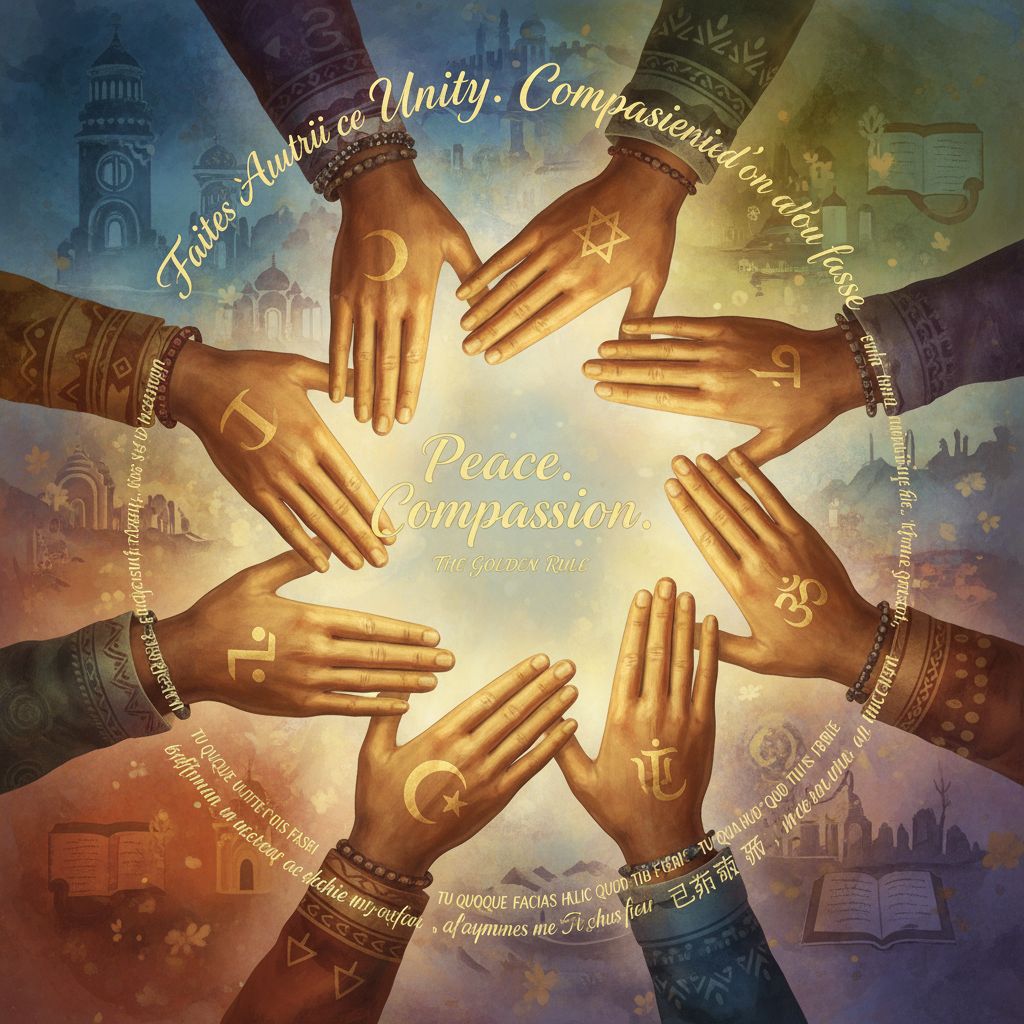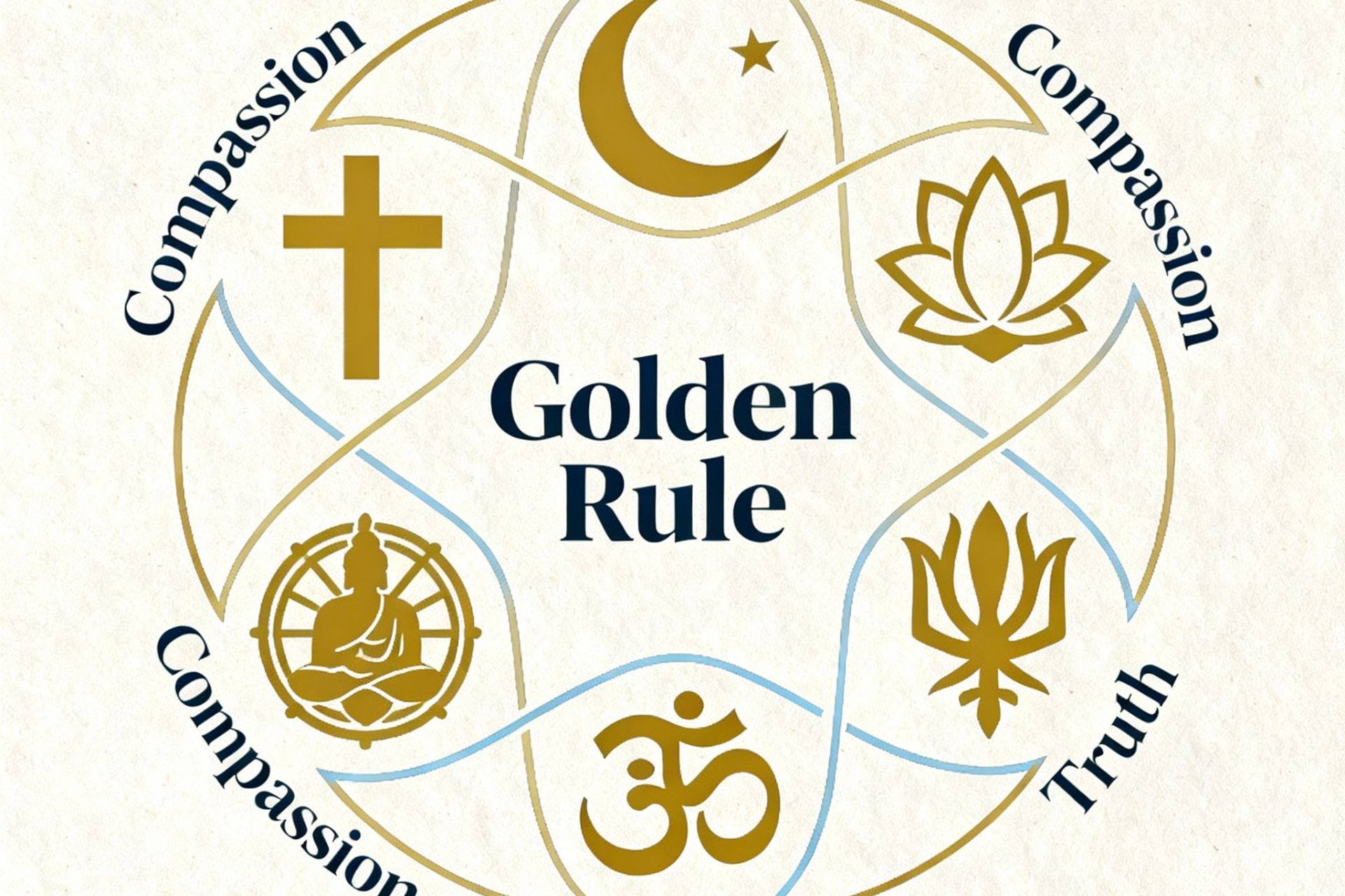Despite the headlines about religious conflicts and theological debates, there's a remarkable truth hiding in plain sight: the world's major religions share far more similarities than differences. From Christianity to Islam, Judaism to Hinduism, and Buddhism to Sikhism, these ancient traditions contain nearly identical core principles that reveal humanity's shared spiritual DNA.
Recent research shows that when we strip away the cultural packaging and focus on fundamental teachings, religions worldwide have been delivering the same essential messages for thousands of years. This isn't about claiming all religions are identical—it's about recognizing the universal human quest for meaning, morality, and transcendence that connects us all.
The Golden Rule: Humanity's Universal Ethical Code

Perhaps the most striking similarity across religions is the Golden Rule—the principle of treating others as you would want to be treated. This isn't just a nice sentiment; it appears in virtually identical form across every major faith tradition:
Christianity: "So in everything, do to others what you would have them do to you" (Matthew 7:12)
Islam: "None of you truly believes until he wishes for his brother what he wishes for himself" (Hadith)
Buddhism: "Hurt not others with what pains yourself" (Udanavarga 5:18)
Judaism: "What is hateful to you, do not do to your neighbor" (Talmud, Shabbat 31a)
Hinduism: "This is the sum of duty: do not do to others what would cause pain if done to you" (Mahabharata 5:1517)
Sikhism: "Do not create enmity with anyone, for God is within everyone" (Guru Granth Sahib 259)
The fact that this principle emerged independently across different cultures and time periods suggests something profound about human nature and our innate understanding of moral reciprocity.
Belief in Divine Reality: Different Names, Same Source
Nearly every major religion acknowledges the existence of a supernatural reality or divine power that transcends the physical world. While the names and conceptualizations differ, the fundamental belief remains consistent:
Monotheistic traditions (Christianity, Islam, Judaism) worship one supreme God
Hindu traditions recognize Brahman as the ultimate reality underlying all existence
Buddhist philosophy acknowledges transcendent truths beyond material existence
Sikh teachings center on devotion to one God (Ik Onkar)
Even polytheistic traditions often recognize an underlying divine unity. Hindu philosophy teaches that all gods are manifestations of the same ultimate reality, while ancient Greek mystery religions suggested all deities were essentially one divine force expressed through different names.
Universal Moral Framework: The Shared Ethical Foundation

All major religions provide comprehensive ethical and moral frameworks that guide human behavior, emphasizing remarkably similar values:
Compassion and Charity
Every religion emphasizes caring for others and helping those in need:
Christianity: "Give to the one who asks you" (Matthew 5:42)
Islam: "The believer's shade on the Day of Resurrection will be his charity" (Hadith)
Judaism: "If there is a poor man among your brothers... you shall open your hand wide to him" (Deuteronomy 15:7-8)
Buddhism: "If you want others to be happy, practice compassion"
Hinduism: Service to others is considered a path to spiritual growth
Truth and Honesty
Truthfulness forms the foundation of trust in all religious traditions:
Christianity: "Put off falsehood and speak truthfully" (Ephesians 4:25)
Islam: "Be with those who are true" (Quran 9:119)
Judaism: "Keep far from a false charge" (Exodus 23:7)
Buddhism: Emphasizes right speech as part of the Eightfold Path
Hinduism: "Truth is the highest virtue" (Mahabharata)
Forgiveness and Reconciliation
The power of forgiveness appears across all traditions:
Christianity: "Forgive, and you will be forgiven" (Luke 6:37)
Islam: "Allah loves those who do good" (Quran 5:13)
Judaism: Emphasis on repentance and making amends
Buddhism: Letting go of anger and resentment
Hinduism: "Forgiveness is the virtue of the brave" (Mahabharata)
Sacred Texts: Different Books, Similar Messages
While each religion has its unique scriptures, the core themes and psychological insights are remarkably consistent across traditions:
All sacred texts address fundamental human questions:
Purpose of existence and meaning of life
Moral guidance for ethical living
Coping with suffering and adversity
Personal growth and spiritual transformation
Community relationships and social harmony
Life after death and ultimate destiny
The fact that texts written thousands of years apart in different cultures contain such similar wisdom suggests these represent universal human insights rather than purely cultural constructs.
Prayer and Worship: Universal Human Practices
Despite different rituals and traditions, all religions engage in structured prayer and worship practices:
Common Elements:
Regular prayer schedules (Jews pray 3 times daily, Muslims 5 times, Christians have traditional prayer times)
Community worship in dedicated spaces (synagogues, mosques, churches, temples)
Sacred postures and movements during prayer
Ritual purification before worship
Collective recitation of sacred texts and prayers
These practices serve similar psychological and spiritual functions across traditions: connecting with the divine, building community bonds, and providing structure for spiritual development.
Afterlife Beliefs: Hope Beyond Death
While specific details vary, most religions share beliefs about life continuing beyond physical death:
Christianity and Islam: Heaven and hell based on earthly actions and faith
Hinduism and Buddhism: Reincarnation and karma determining future lives
Judaism: Diverse views including Olam Ha-Ba (World to Come) and Gan Eden (Paradise)
Indigenous traditions: Ancestral realms and spiritual continuation
These beliefs serve similar functions: providing hope, encouraging moral behavior, and offering comfort in the face of mortality.
Festivals and Rituals: Celebrating Shared Human Experiences
Religious festivals across traditions share common themes and purposes:
Universal Festival Elements:
Seasonal celebrations marking agricultural cycles and natural transitions
Gratitude and thanksgiving for blessings received
Community gathering and strengthening social bonds
Remembrance of important historical or spiritual events
Renewal and purification - starting fresh spiritually
Joy and celebration as expressions of faith
Whether it's Diwali, Christmas, Eid, Passover, or Vesak, these celebrations serve to reinforce community identity, transmit cultural values, and provide meaningful structure to the year.
The Science Behind Religious Similarities
Recent research suggests these similarities aren't coincidental. Studies show that members of different religions living in different countries still show remarkable cultural similarities, suggesting that religious beliefs tap into fundamental aspects of human psychology and social organization.
Scholars like Wilfred Cantwell Smith propose that all religions share a common source, while others like John Hick suggest they're culturally different responses to the same ultimate reality. Whether you view this through a spiritual or anthropological lens, the evidence points to deep underlying unity.
Breaking Down Barriers Through Understanding
This research has profound implications for our increasingly connected world. As one scholar noted: "When people defocus from dissimilarities and look at what we have in common, that's where dialogue can begin". Understanding these shared values provides a foundation for:
Interfaith dialogue and cooperation
Reducing religious prejudice and misunderstanding
Finding common ground on global challenges
Building bridges between different communities
Promoting peace through shared values
The Golden Rule alone provides a universal ethical framework that transcends religious boundaries and offers hope for human cooperation.
What This Means for You
Whether you're religious, spiritual, or secular, these findings reveal something beautiful about human nature: our shared quest for meaning, morality, and transcendence. The fact that diverse cultures independently developed similar ethical principles suggests these values reflect deep truths about what it means to be human.
Rather than focusing on what divides us, we can celebrate the remarkable consistency in humanity's highest aspirations. From the Golden Rule to compassion for others, from seeking truth to caring for the vulnerable, these universal values offer a roadmap for building a more understanding and peaceful world.
The next time you encounter someone from a different religious tradition, remember: beneath the surface differences lie shared human values that have guided our species for millennia. That's not just fascinating—it's profoundly hopeful.
What similarities between religions surprised you most? The universal presence of the Golden Rule, the shared emphasis on compassion, or something else entirely? These connections remind us that at our core, humans share far more than what separates us.



